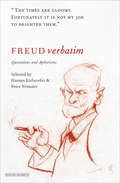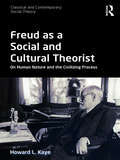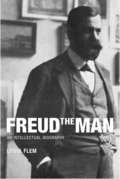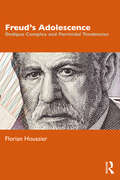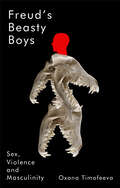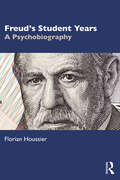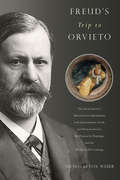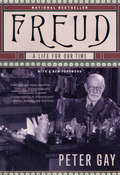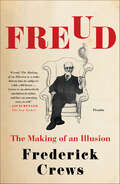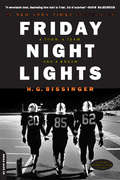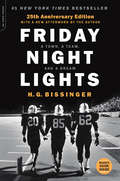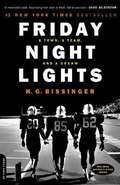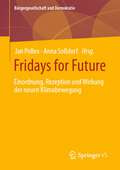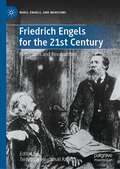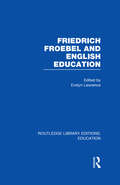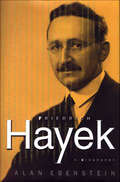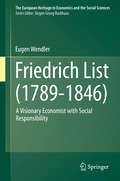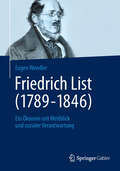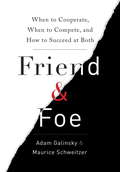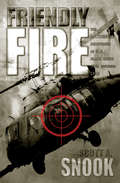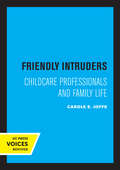- Table View
- List View
Freud
by Élisabeth RoudinescoÉlisabeth Roudinesco's bold reinterpretation of Sigmund Freud is a biography for the twenty-first century--a sympathetic yet impartial appraisal of a genius admired but misunderstood in his time and ours. Alert to tensions in his character and thought, she views Freud less as a scientific thinker than as an interpreter of civilization and culture.
Freud Verbatim: Quotations and Aphorisms
by Sigmund FreudThe founder of psychoanalysis and one of the twentieth century&’s most influential thinkers, in his own words. Sigmund Freud is on the very short list of historical figures who have profoundly influenced—perhaps even revolutionized—the way we think and the way we see the world and ourselves. This book compiles quotes, maxims, observations, and witticisms from the founder of psychoanalysis and the popularizer of such terms as ego, superego, and id. Covering subjects ranging from politics and religion to love and sex, this collection assembles passages from Freud&’s major works, as well as making use of personal letters to his friends and family. Organized into ten thematic chapters, this thought-provoking compilation provides a representative look into all of Freud&’s work.
Freud as a Social and Cultural Theorist: On Human Nature and the Civilizing Process (Classical and Contemporary Social Theory)
by Howard L. KayeThis book offers a new account of Freud’s work by reading him as the social theorist and philosopher he always aspired to be, and not as the medical scientist he publicly claimed to be. In doing so, the author demonstrates that’s Freud’s social, moral, and cultural thought constitutes the core of his life’s work as a theorist, and is the thread that binds his voluminous writings together: from his earliest essays on the neuroses, to his foundational writings on dreams and sexuality, and to his far-ranging reflections on art, religion, and the dynamics of culture. Returning to the fundamental questions and concerns that animate Freud’s work - the nature of evil; the origins of religion, morality, and tradition; and the looming threat of resurgent barbarism - Freud as a Social and Cultural Theorist provides the first systematic re-examination of Freud’s social and cultural thought in more than a generation. As such, it will be of interest to social and cultural theorists, social philosophers, intellectual and cultural historians, and those with interests in psychoanalysis and its origins.
Freud the Man: An Intellectual Biography
by Lydia FlemThe world knows Freud as a thinker--one of the founding giants of modern culture. Now Lydia Flem paints a unique and unforgettable portrait of Frued the man: a father, husband, and friend, a secular Jew with passion for classical antiquity and European culture, torn between his need to be fully accepted in an anitsemitic society while remaining fatihful to his orgins.Flem enters into the depths of Freud's creativity, showing how his thinking is connected to his immersion in the arts, the history of religions, and mythology. The intimate details of his daily life, his relationships with women, his poetic gifts, his travels, his dreams, his letters to family, friends, and colleagues: all reveal his vision of the unconscious. We accompany Freud on his walks through Vienna and Rome; look over his shoulder as he writes to his fiancee; learn the significance of the Greek, Roman, and Egyptian figurines that stand before him on his desk as he conceives his groundbreaking ideas; and discover the books, read in childhood, that later shape his self-analysis and his theoretical development.Flem draws on an unusually broad range of sources, but she wears her learning lightly: her biography of Freud reads like a novel, full of vivid details and captivating human interest. From the 6-year-old gleefully tearing up a book illustrated with pictures of Persia; to the young doctor balancing his scientific training with his love of Shakespeare; to the psychoanalyst in his prime, conquering the resistance to his theories; to the old man, ravaged by illness, forced to flee into exile in England, Lydia Flem leads us deep into the life of a genius.
Freud's Adolescence: Oedipus Complex and Parricidal Tendencies
by Florian HoussierIn Freud’s Adolescence, Florian Houssier looks at the early years of the Father of Psychoanalysis and considers how his personal experiences shaped his later work. Including excerpts from many letters written by Freud himself, this volume allows a rare glimpse into the inner thoughts and emotions of one of his generation’s greatest minds. Engaging with this lesser-known period of Freud’s life, the vivacity of his incestuous and parricidal fantasies comes to the surface, infiltrating his relational life as well as his dreams. Houssier proposes a new hypothesis about the conflicts of Freud’s adolescence, and their impact on his tendencies in later conflicts. This is the first book that sustains a systematic analysis of this material and adds a new dimension to the biography of Freud by exploring links between his life and creativity from a current theorisation of the adolescent process. This book will be an essential read for all psychoanalysts, psychologists, lecturers, followers of Freud’s work and those looking into psychoanalysis as a whole.
Freud's Beasty Boys: Sex, Violence and Masculinity
by Oxana TimofeevaThis book examines violence and sexuality after Freud. Its characters, though, are not women and men, but rather animals and children. Focusing on three famous Freudian cases in which little boys had issues with animals – Little Hans, The Rat Man, and the Wolf Man – it revises the role played by animals in male gender socialization. Timofeeva demonstrates the relevance of psychoanalysis for anyone who wants to understand how patriarchy works, but she also points to its limitations. For Freud, sexuality creates the background of our psychic lives, and unconscious sexual fantasies are the origins of psychic disorders such as hysteria, obsessions and phobias. But what are the origins of sexual fantasies? Timofeeva argues that behind psychic dramas of sexuality there is something else: a mechanism of violence which she calls ‘the machine of masculinity’ and which she analyses both through Freud’s cases and through the lens of religion, anthropology and her own life experiences. Wolves, rats and horses are magical agents that connect us to the world of the dead – that is, to the history of our culture in which monotheism replaced totemic practices but the basic psychosocial matrix of turning love into violence continues to reproduce itself.
Freud's Student Years: A Psychobiography
by Florian HoussierIn Freud’s Student Years, Florian Houssier presents the life experiences and inner conflicts of Sigmund Freud from his eighteenth birthday to his clinical practice, showing how these experiences informed his later theories.Following on from Freud’s Adolescence: Oedipus Complex and Parricidal Tendencies (2023) and starting at the point of the young Freud’s graduation, Houssier charts the inception of Freud’s ideas on fantasy, the Madonna-Whore complex, the Oedipal Complex, mother-daughter relationships and narcissism. Working chronologically, he looks at the way Freud’s reflection and lamentation on his inhibited adolescence led to a fantasy of possession that informed his later work. Including excerpts from Freud’s private letters to his fiancée, Martha Bernays, and exploring his relationship with Sándor Ferenczi, this volume offers a unique and intimate look into the life and inner workings of the most eminent figure of modern psychoanalysis.Accessible in style and thorough in its assessments of Freud’s personal experiences, this book is an essential read for psychoanalysts and psychologists, as well as students and scholars interested in the history of psychoanalysis and the enduring legacy of Freudian thought.
Freud's Trip to Orvieto: The Great Doctor's Unresolved Confrontation with Antisemitism, Death, and Homoeroticism; His Passion for Paintings; and the Writer in His Footsteps
by Nicholas Fox Weber"Freud’s Trip to Orvieto is at once profound and wonderfully diverse, and as gripping as any detective story. Nicholas Fox Weber mixes psychoanalysis, art history, and the personal with an intricacy and spiritedness that Freud himself would have admired.” -John Banville, author of The Sea and The Blue Guitar"This is an ingenious and fascinating reading of Freud’s response to Signorelli’s frescoes at Orvieto. It is also a meditation on Jewish identity, and on masculinity, memory, and the power of the image. It is filled with intelligence, wit, and clear-eyed analysis not only of the paintings themselves, but how we respond to them in all their startling sexuality and invigorating beauty.” -Colm Tóibín, author of Brooklyn and Nora WebsterAfter a visit to the cathedral at Orvieto in Italy, Sigmund Freud deemed Luca Signorelli’s frescoes the greatest artwork he’d ever encountered; yet, a year later, he couldn’t recall the artist’s name. When the name came back to him, the images he had so admired vanished from his mind’s eye. This is known as the "Signorelli parapraxis” in the annals of Freudian psychoanalysis and is a famous example from Freud’s own life of his principle of repressed memory. What was at the bottom of this? There have been many theories on the subject, but Nicholas Fox Weber is the first to study the actual Signorelli frescoes for clues.What Weber finds in these extraordinary Renaissance paintings provides unexpected insight into this famously confounding incident in Freud’s biography. As he sounds the depths of Freud’s feelings surrounding his masculinity and Jewish identity, Weber is drawn back into his own past, including his memories of an adolescent obsession with a much older woman.Freud’s Trip to Orvieto is an intellectual mystery with a very personal, intimate dimension. Through rich illustrations, Weber evokes art’s singular capacity to provoke, destabilize, and enchant us, as it did Freud, and awaken our deepest memories, fears, and desires.Nicholas Fox Weber is the director of the Josef and Anni Albers Foundation and author of fourteen books, including biographies of Balthus and Le Corbusier. He has written for the New Yorker, New York Times, Los Angeles Times, Wall Street Journal, Le Monde, ARTnews, Town & Country, and Vogue, among other publications.
Freud: A Life For Our Time
by Peter GayNorton celebrates the 150th anniversary of Freud's birth by reissuing Peter Gay's best-selling biography, featuring a new introduction.
Freud: The Making of an Illusion
by Frederick CrewsFrom the master of Freud debunkers, the book that definitively puts an end to the myth of psychoanalysis and its creatorSince the 1970s, Sigmund Freud’s scientific reputation has been in an accelerating tailspin—but nonetheless the idea persists that some of his contributions were visionary discoveries of lasting value. Now, drawing on rarely consulted archives, Frederick Crews has assembled a great volume of evidence that reveals a surprising new Freud: a man who blundered tragicomically in his dealings with patients, who in fact never cured anyone, who promoted cocaine as a miracle drug capable of curing a wide range of diseases, and who advanced his career through falsifying case histories and betraying the mentors who had helped him to rise. The legend has persisted, Crews shows, thanks to Freud’s fictive self-invention as a master detective of the psyche, and later through a campaign of censorship and falsification conducted by his followers.A monumental biographical study and a slashing critique, Freud: The Making of an Illusion will stand as the last word on one of the most significant and contested figures of the twentieth century.
Freundschaftsnetzwerke und Delinquenz von Jugendlichen: Eine empirische Untersuchung mit Methoden der Sozialen Netzwerkanalyse (Kriminalität und Gesellschaft)
by Dominik GerstnerDominik Gerstner beschäftigt sich mit der Bedeutung von Gleichaltrigen bzw. Peer-Beziehungen für die Entstehung und Bewertung von abweichendem Verhalten im Jugendalter und damit mit einem klassischen Thema der Kriminalsoziologie. Durch die Anwendung innovativer Theorien – wie z.B. der Situational Action Theory – und dem methodischen Ansatz der Netzwerkanalyse werden dieser Thematik neue Impulse gegeben. Im Zentrum der vorliegenden Arbeit stehen Analysen quantitativer Daten, in denen Einflüsse der Freunde in der Schulklasse auf das delinquente Verhalten von Jugendlichen sowie die Bedeutung dieses Verhaltens für die Popularität in Schulklassen untersucht wird. Die empirischen Auswertungen basieren auf den Daten der MPI-Schulbefragung 2011, die in zwei deutschen Großstädten durchgeführt wurde.
Friday Night Lights
by H. G. BissingerReturn once again to the timeless account of the Permian Panthers of Odessa--the winningest high-school football team in Texas history. <P><P> Odessa is not known to be a town big on dreams, but the Panthers help keep the hopes and dreams of this small, dusty town going. <P><P>Socially and racially divided, its fragile economy follows the treacherous boom-bust path of the oil business. <P><P>In bad times, the unemployment rate barrels out of control; in good times, its murder rate skyrockets. But every Friday night from September to December, when the Permian High School Panthers play football, this West Texas town becomes a place where dreams can come true. <P><P>With frankness and compassion, H. G. Bissinger chronicles a season in the life of Odessa and shows how single-minded devotion to the team shapes the community and inspires--and sometimes shatters--the teenagers who wear the Panthers' uniforms.
Friday Night Lights, 25th Anniversary Edition: A Town, a Team, and a Dream
by H. G. BissingerWith a new afterword by the author Return once again to the timeless account of the Permian Panthers of Odessa--the winningest high-school football team in Texas history. Odessa is not known to be a town big on dreams, but the Panthers help keep the hopes and dreams of this small, dusty town going. Socially and racially divided, its fragile economy follows the treacherous boom-bust path of the oil business. In bad times, the unemployment rate barrels out of control; in good times, its murder rate skyrockets. But every Friday night from September to December, when the Permian High School Panthers play football, this West Texas town becomes a place where dreams can come true. With frankness and compassion, H. G. Bissinger chronicles a season in the life of Odessa and shows how single-minded devotion to the team shapes the community and inspires--and sometimes shatters--the teenagers who wear the Panthers' uniforms. The author’s new afterword not only updates the story but also offers a sure-to-be controversial assessment of the state of football today.
Friday Night Lights: A Town, a Team, and a Dream
by H. G. BissingerThe classic, best-selling story of life in the football-driven town of Odessa, Texas, includes a new afterword that looks at the players and the town 10 years later.
Fridays for Future: Einordnung, Rezeption und Wirkung der neuen Klimabewegung (Bürgergesellschaft und Demokratie)
by Anna Soßdorf Jan PollexDer Sammelband verfolgt das Ziel, eine erste umfassende Bilanz zur Rezeption und Wirkung der "Fridays for Future"-Bewegung vorzunehmen. Im ersten Teil stellen die Autor*innen in verschiedenen Kapiteln den Stand der sozialwissenschaftlichen Forschung zur Bewegung dar. Im zweiten Teil des Bandes widmen sich die Autor*innen den Wirkungen, die "Fridays for Future" auf unterschiedlichen Dimensionen der Gesellschaft hat. Die Beiträge in diesem Teil gehen der Frage nach, wie die Bewegung u.a. politische Parteien, lokale und regionale Akteure oder auch die Wissenschaft insgesamt beeinflusst hat, bzw. welche Impulse sie setzen konnte.
Friedrich Engels for the 21st Century: Reflections and Revaluations (Marx, Engels, and Marxisms)
by Terrell Carver Smail RapicThis edited volume presents an interdisciplinary and international revaluation of Friedrich Engels as much more than “junior partner” to Karl Marx or “second fiddle” in the Marxist orchestra. The nineteen critical essays in this collection are the work of scholars from Germany, USA, UK, Italy, China, India, Mexico and the Philippines. Together they present and evaluate archival material and scholarly commentary that covers epistemology, political economy, political theory, gender studies, cultural studies, political geography, philosophy of social science and sociological studies of class-conflict. Students, activists and specialists will find fresh consideration of familiar works, such as The Condition of the Working Class in England, The Origin of the Family, Private Property and the State, and The Dialectics of Nature. They will also be able to explore Engels’s less familiar pamphleteering, literary criticism and political commentary through detailed contextualization and careful analysis. Friedrich Engels for the 21st Century: Perspectives and Problems is unique in putting different intellectual and political receptions of Engels’s work into productive conversation, particularly from non-Anglophone scholars, translated here into English. Readers will appreciate why Engels has been so widely celebrated some two hundred years after his birth.
Friedrich Engels – Eine Biographie 1: Band 1: Friedrich Engels in seiner Frühzeit – Herausgegeben und eingeleitet von Stephan Moebius (Klassiker der Sozialwissenschaften)
by Gustav MayerDie hier wieder zugänglich gemachte zweibändige Biographie Friedrich Engels‘ von Gustav Mayer gilt bis heute als bedeutendes Standardwerk. Neu herausgegeben und eingeleitet von Stephan Moebius.
Friedrich Engels – Eine Biographie 2: Band 2: Friedrich Engels und der Aufstieg der Arbeiterbewegung in Europa (Klassiker der Sozialwissenschaften)
by Gustav MayerDie hier wieder zugänglich gemachte zweibändige Biographie Friedrich Engels‘ von Gustav Mayer gilt bis heute als bedeutendes Standardwerk. Neu herausgegeben von Stephan Moebius.
Friedrich Froebel and English Education (Routledge Library Editions: Education)
by Evelyn LawrenceThis collection of essays describes Froebel’s life and the history of his influence on the education of young children in Britain. It also traces the religious roots of his philosophy and discusses his psychological and educational principles in the light of developments in these fields since his day.
Friedrich Hayek: A Biography
by Alan EbensteinThis biography tells the story of one of the most important public figures of the twentieth century, Friedrich Hayek.Here is the first full biography of Friedrich Hayek, the Austrian economist who became, over the course of a remarkable career, the great philosopher of liberty in our time. In this richly detailed portrait, Alan Ebenstein chronicles the life, works, and legacy of a visionary thinker, from Hayek's early years as the scholarly son of a physician in fin-de-siecle Vienna on an increasingly wider world as an economist and political philosopher in London, New York, and Chicago.Ebenstein gives a balanced, integrated account of Hayek's extraordinary diverse body of work, from his fist encounter with the free market ideas of mentor Ludwig Von Mises to his magisterial writings in later life on the legal, political, ethical, and economic requirements of a free society. Awarded the Nobel Prize in 1974, Hayek's vision of a renewed classical liberalism-of free markets and free ideas in free societies-has taken hold in much of the world.Alan Ebenstein's clearly written account is an essential starting point for anyone seeking to understand why Hayek's ideas have become the guiding force of our time. His illuminating portrait of Hayek the man brings to new life the spirit of a great scholar and tenacious advocate who has become, in Peter Drucker's words, "our time's preeminent social philosopher."
Friedrich List (1789-1846)
by Eugen WendlerFriedrich List (1789-1846) was a prophet of social market economy, national economy and the infant-industry theory. In this comprehensive biography the international influence and reception of List's theories is presented together with his extraordinary vita List was a notable early advocate of economic integration of the many separate states of 19th century Germany. His basic theory is that of productive resources and the need to protect infant industries until they have matured enough to stand alone. He is recognized as a visionary economist with social responsibility and as an influential railway pioneer. He was a liberal and a democrat who promoted an extended representative democracy, including respect for human rights and civil liberties, to accompany industrial development His highly influential main work "The National System of Political Economy" has been translated into many languages. Eugen Wendler, the renowned author and List expert, not only builds upon his many years of research, but also discusses several new sources. This richly illustrated book is as informative as it is well written.
Friedrich List (1789-1846)
by Eugen WendlerIn dieser ebenso unterhaltsamen wie informativen Biografie wird die Wirkungs- und Rezeptionsgeschichte der Theorien von Friedrich List auf der Basis seines außergewöhnlichen Lebenslaufes dargestellt. Der renommierte und mehrfach für seine Forschung ausgezeichnete List-Experte Eugen Wendler fasst hier die Ergebnisse seiner langjährigen Forschungsarbeit zusammen und ergänzt sie durch neueste Erkenntnisse und Quellen. So ist ein umfassendes und werthaltiges Werk entstanden, das zudem zahlreiche bislang noch unbekannte Abbildungen enthält.
Friend & Foe: When to Cooperate, When to Compete, and How to Succeed at Both
by Adam Galinsky Maurice SchweitzerWhat does it take to succeed? This question has fueled a long-running debate. Some have argued that humans are fundamentally competitive, and that pursuing self-interest is the best way to get ahead. Others claim that humans are born to cooperate and that we are most successful when we collaborate with others. In FRIEND AND FOE, researchers Galinsky and Schweitzer explain why this debate misses the mark. Rather than being hardwired to compete or cooperate, we have evolved to do both. In every relationship, from co-workers to friends to spouses to siblings we are both friends and foes. It is only by learning how to strike the right balance between these two forces that we can improve our long-term relationships and get more of what we want.Here, Galinsky and Schweitzer draw on original, cutting edge research from their own labs and from across the social sciences as well as vivid real-world examples to show how to maximize success in work and in life by deftly navigating the tension between cooperation and competition. They offer insights and advice ranging from: how to gain power and keep it, how to build trust and repair trust once it's broken, how to diffuse workplace conflict and bias, how to find the right comparisons to motivate us and make us happier, and how to succeed in negotiations - ensuring that we achieve our own goals and satisfy those of our counterparts.Along the way, they pose and offer surprising answers to a number of perplexing puzzles: when does too much talent undermine success; why can acting less competently gain you status and authority, where do many gender differences in the workplace really come from, how can you use deception to build trust, and why do you want to go last on American Idol and in many interview situations, but make the first offer when negotiating the sale of a new car.We perform at our very best when we hold cooperation and competition in the right balance. This book is a guide for navigating our social and professional worlds by learning when to cooperate as a friend and when to compete as a foe--and how to be better at both.
Friendly Fire: The Accidental Shootdown of U.S. Black Hawks over Northern Iraq
by Scott A. SnookOn April 14, 1994, two U.S. Air Force F-15 fighters accidentally shot down two U.S. Army Black Hawk Helicopters over Northern Iraq, killing all twenty-six peacekeepers onboard. In response to this disaster the complete array of military and civilian investigative and judicial procedures ran their course. After almost two years of investigation with virtually unlimited resources, no culprit emerged, no bad guy showed himself, no smoking gun was found. This book attempts to make sense of this tragedy--a tragedy that on its surface makes no sense at all. With almost twenty years in uniform and a Ph.D. in organizational behavior, Lieutenant Colonel Snook writes from a unique perspective. A victim of friendly fire himself, he develops individual, group, organizational, and cross-level accounts of the accident and applies a rigorous analysis based on behavioral science theory to account for critical links in the causal chain of events. By explaining separate pieces of the puzzle, and analyzing each at a different level, the author removes much of the mystery surrounding the shootdown. Based on a grounded theory analysis, Snook offers a dynamic, cross-level mechanism he calls "practical drift"--the slow, steady uncoupling of practice from written procedure--to complete his explanation. His conclusion is disturbing. This accident happened because, or perhaps in spite of everyone behaving just the way we would expect them to behave, just the way theory would predict. The shootdown was a normal accident in a highly reliable organization.
Friendly Intruders: Childcare Professionals and Family Life
by Carole JoffeThe governments of many industrialized societies have developed extensive childcare facilities and services to meet the needs of young children and their working parents, but no such program on a national scale has yet evolve in the United Staes. Some who oppose federal aid or control believe that mothers should remain at home with their preschool children rather than turn them over to childcare professionals--the "friendly intruders" of the titels--and that any other policy is a threat to the moral climate and stability of family life. However, since the demand for childcare services is very great, and since Congress has previously passed relevant legislation (which was vetoed by President Nixon), the issue of childcare will surely rise again soon. In this study, based upon direct observation of a local childcare program in California, the author examines several pof the practical policy issues concerning childcare which have not yet been resolved. Who will control such programs in the future, public school systems or others? Which agencies or institutions will certify the competence of childcare personnel? To what extent will parents contribute to the content of the programs provided for their young children? A major part of Professor Joffe's study is concerned with the emerging professionalism of early childhood educators. In a pattern now understood to be classic, such persons seek status and recognition through education, certification, and membership in professional associations. However, what happens when parents and professional disagree about values, behavioral norms, and the educational content of a nursery school program? Who is the "expert" in such a confrontation? The author observed profoundly different orientations to childcare not only between professionals and parents, but also among different groups of parents, especially along racial and class lines; how can professionals accommodate such differences? The author's conclusions emerge from careful study of day-by-day encounters between staff, parents and supervisors, giving to her book a sense of immediacy and well-focused understanding that is rarely achieved in academic studies. Parents, educators and policy analysts concerned with the subject will find it indispensable. This title is part of UC Press's Voices Revived program, which commemorates University of California Press's mission to seek out and cultivate the brightest minds and give them voice, reach, and impact. Drawing on a backlist dating to 1893, Voices Revived makes high-quality, peer-reviewed scholarship accessible once again using print-on-demand technology. This title was originally published in 1977.

